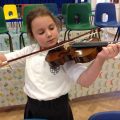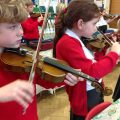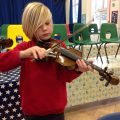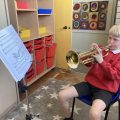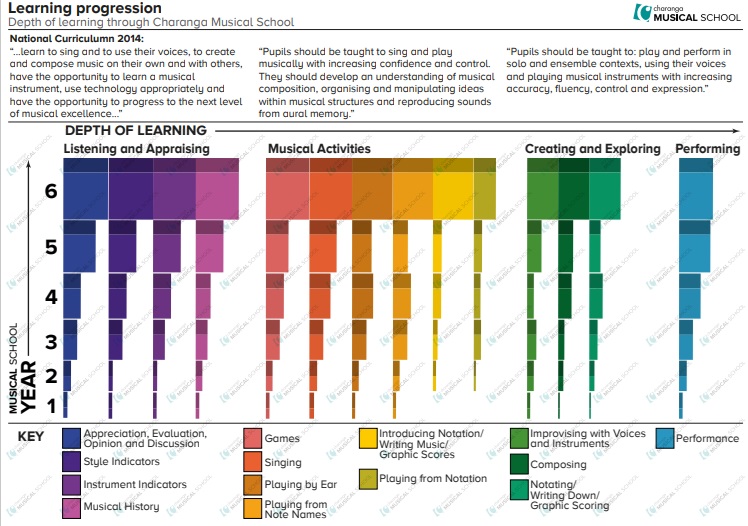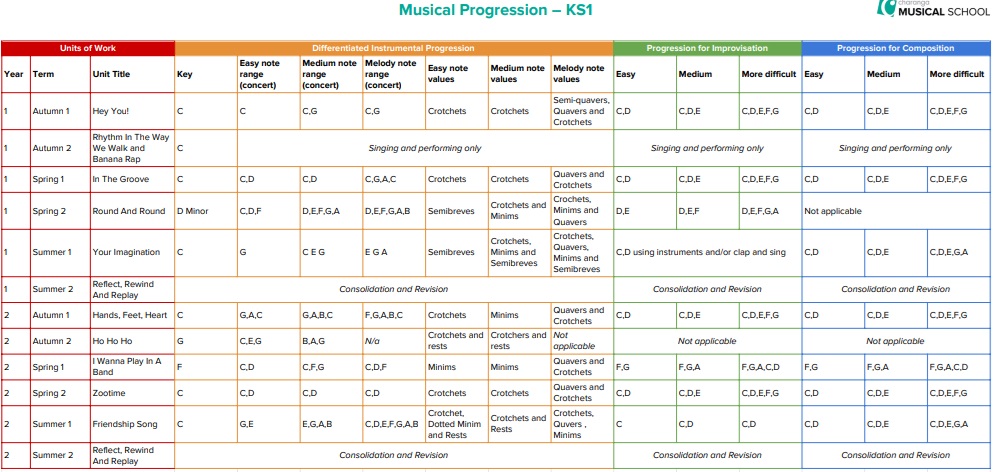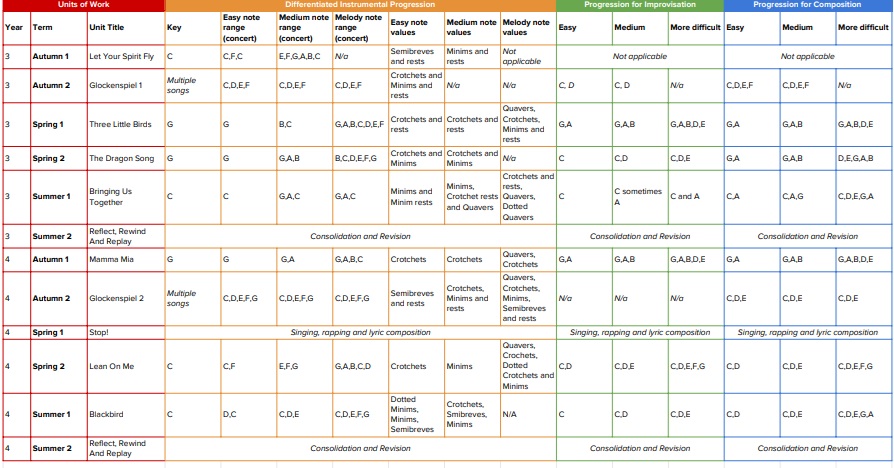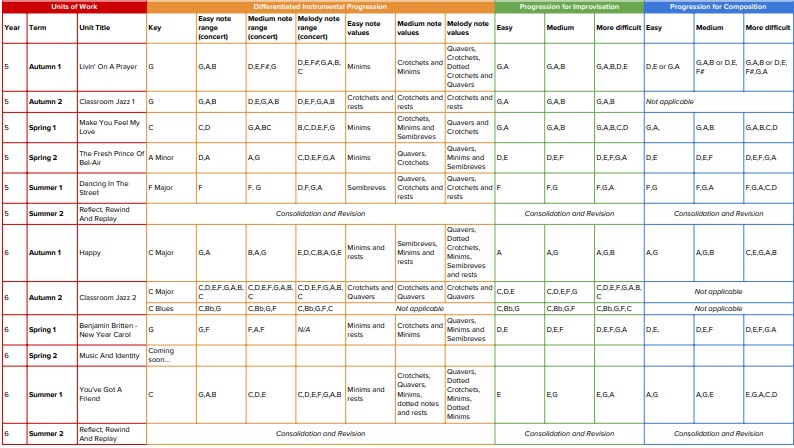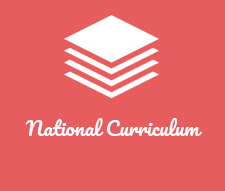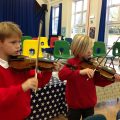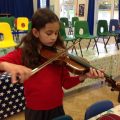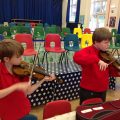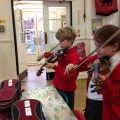“We enjoyed doing our talent show and finding out what other children were good at. We also liked performing to other people.”
“We’ve liked making an orchestra singing songs in different languages.”
“Some of us went to the Royal Albert Hall with choir – that was the best day ever!”
At Manland we use Charanga to support our music lessons. The Charanga scheme meets all the statutory music curricular requirements in the National Curriculum for England. It is recognised by Ofsted and is multi-award-winning.
Our scheme is tailored for each year group and is structured around units and steps that support lesson planning and delivery across the year: 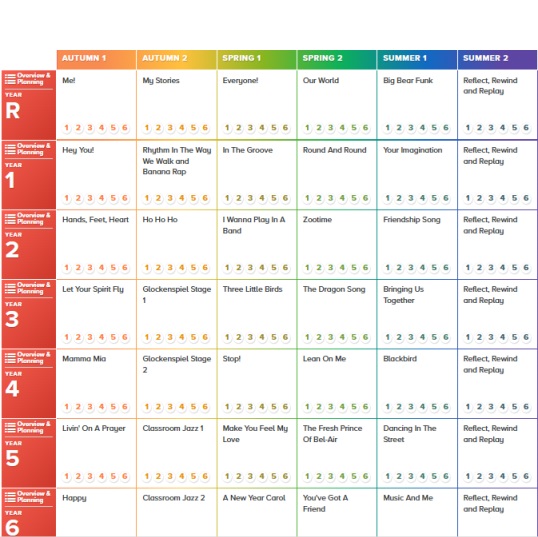
Scheme Overview
Our music scheme provides a week-by-week lesson support for each year group in the school and includes lesson plans, assessment, clear progression, and engaging whiteboard resources to support every lesson. The scheme uses an integrated, practical, exploratory and child-led approach to musical learning. The interrelated dimensions of music weave through the units to encourage the development of musical skills as the learning progresses through listening and appraising, differing musical activities (including creating and exploring) and performing.
How the Scheme is structured
Each Unit of Work comprises the strands of musical learning which correspond with the national curriculum for music:
- Listening and Appraising
- Musical Activities
- Warm-up Games
- Optional Flexible Games
- Singing
- Playing instruments
- Improvisation
- Composition
- Performing
Mastery
The units of work enable children to understand musical concepts through a repetition-based approach to learning. Learning about the same musical concept through different musical activities enables a more secure, deeper learning and mastery of musical skills. Musical teaching and learning is not neat or linear. The strands of musical learning, presented in the lesson plans and the on-screen resources, are part of the learning spiral. Over time, children can both develop new musical skills and concepts, and re-visit established musical skills and concepts. Mastery means both a deeper understanding of musical skills and concepts and learning something new.
Teachers at Manland use resources which bring all the possible musical learning outcomes together for the end of year and Key Stage, linking to the Progressive Teacher and Children’s Statements within the Assessment Framework. It highlights differentiated and deeper learning for each child that constantly builds through each step/lesson, unit and year:
Learning Progression
From Reception to Year 6, the learning consists of six half-termly units of work. The final unit in each year – Reflect, Rewind and Replay – allows for revision and more extension activities.
The diagram above depicts the depth of learning that occurs as the children move through the year groups. As they progress, the colour deepens and the learning widens.
The musical progression through KS1 and KS2 is demonstrated in the diagrams below. The instrumental work is differentiated allowing children to move through the relevant parts as they need to.
Key Stage 1 Musical Progression
Key Stage 2 Musical Progression
The Progression of Knowledge & Skills
Progression of knowledge and skills for each year group can be accessed below:
Reception – Knowledge and Skills
Knowledge Organisers
Knowledge organisers for each year group can be accessed below:
Our Aim – Music National Curriculum
The National Curriculum for music aims to ensure that all pupils:
- Perform, listen to, review and evaluate music across a range of historical periods, genres, styles and traditions, including the works of the great composers and musicians.
- Learn to sing and to use their voices, to create and compose music on their own and with others, have the opportunity to learn a musical instrument, use technology appropriately and have the opportunity to progress to the next level of musical excellence.
- Understand and explore how music is created, produced and communicated, including through the inter-related dimensions: pitch, duration, dynamics, tempo, timbre, texture, structure and appropriate musical notations.
Music Development Plan
Music Development Plan 2024-2025
Ways to Develop Music Skills at Home
- Enjoy music together-listen to a wide variety of music styles and discuss what you can hear. Share opinions on the music you are listening to.
- Sing! Sing nursery rhymes, sing along to the radio, sing in choirs or groups in the community.
- Make your own music-use pots and pans, tap rhythms on the table, use apps to create songs and compositions
- Listen to live music-attend concerts together, listen to virtual events online
- Play or make your own instruments

